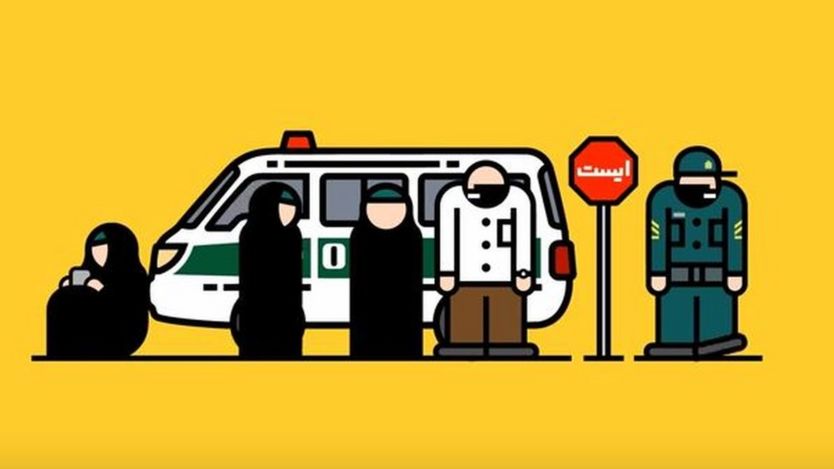A van, a few bearded men and one or two women in black chadors
The BBC reports on a new app in Iran that warns people of the location of the “morality police” aka Ershad.
Ershad’s mobile checkpoints which usually consist of a van, a few bearded men and one or two women in black chadors, are deployed in towns across Iran and appear with no notice.
Women?! But isn’t that immoral? Unless they’re related to all the men.
Ershad personnel have a very extensive list of powers ranging from issuing warnings and forcing those they accuse of violating Iran’s Islamic code of conduct, to make a written statement pledging to never do so again, to fines or even prosecuting offenders.
It’s such a horrendous way to live I can’t even really imagine it. Or maybe I can but I turn away because it’s too awful.
The range of offences which Ershad patrols deal with are extensive. From wearing too much makeup in public to wearing too little Hijab or head cover for women, to what is called western influenced hair style and trendy clothing for men.
Just exactly what amounts to immoral behaviour, can be widely open to the interpretation of the Ershad agent on the spot. So buying your clothes and or makeup from authorised shops, won’t necessarily keep you out of trouble. If an Ershad agent sees the combination unfit according the Sharia code of conduct, you can still end up being warned or even prosecuted.
Also, if you’re caught walking or riding with your opposite sex friend, you still could end up being stopped, questioned and prosecuted by Ershad because that’s another violation of Islamic code of conduct.
It’s all clothes and sex. Being kind, helping people who need help, not pushing people into puddles – never mind all that, just arrest that woman for having some hair showing.


I suspect if you look into it, the women ride along in order to police women. In the best case because male police can’t talk to women; in the worst case because their duties involve seeing women without their hijab for some reason. I shudder to think what the latter case might entail.
I applaud apps like this, but they can be dangerous for users – as is briefly mentioned in the BBC article – even if the developers know what they’re doing. Users need to know what they’re doing too. I won’t bore everyone with details, much as I’d like to, but police and security forces all over the world know about apps like this and have a strong track record of being able to exploit them.
I can’t comment on this particular app, but I hope its users stay safe.
As a teenager I recall a Nintendo magazine I used to read making some kind of joke about one of its staff having had a number of illegal haircuts. I recall finding the idea of an illegal haircut absolutely hilarious.
A few years later I heard about the Taliban being keen to crack down on men having haircuts inspired by Western movies. It seemed so much less funny.